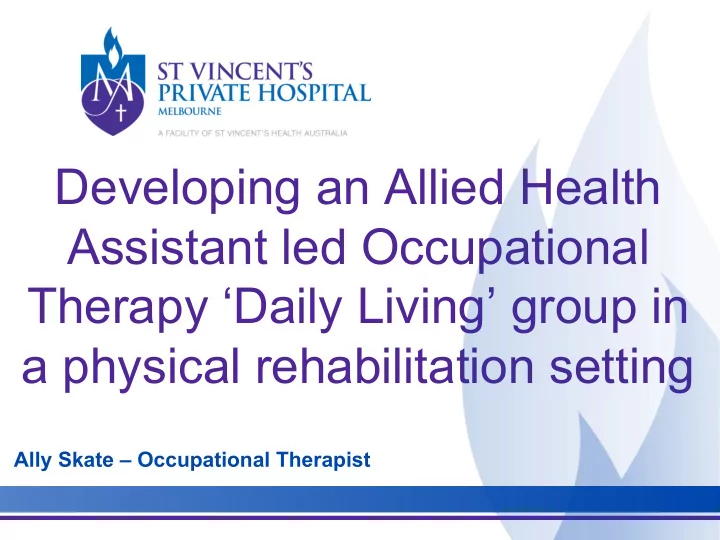

Developing an Allied Health Assistant led Occupational Therapy ‘Daily Living’ group in a physical rehabilitation setting Ally Skate – Occupational Therapist
SVPHM Background • 4 campuses – East Melbourne • 4 acute wards, inpatient rehabilitation unit (24 beds) & outpatient rehabilitation centre • Primarily orthopaedic and reconditioning • Typical length of stay: 7-10 days • 7 day Allied Health service – OT & PT • 4 OTs & 1 OT AHA
OT & AHA Role Rehabilitation goal: improve patient’s independence in activities of daily living, through a multidisciplinary approach, to allow them to return home after a major surgery or health event OT Role: Assessment, goal setting, treatment planning and delivering patient-centred intervention AHA Role: Delivering patient-centred intervention prescribed by the treating OT; provide regular handover to treating clinicians on patient progress
AHA Role & Duties • Self-care reviews • Co-facilitating meal preparation groups with the OT • Completing equipment orders • Providing 1:1 education • Managing organisational duties
Identifying gaps in our service • Service expansion – 18 to 24 beds • Increased external expectations and pressure • Focus on patient-centred care • Considerable amount of therapist time spent in patient education • Under-utilised potential in our AHAs
Project process • Identify service gap and needs 1. • Develop project plan, with goals & timeframes Planning • Information gathering: brainstorm frequency, duration, topics • Develop group protocol • Create group content • Develop/gather resources for group – presentation, information handouts, 2. patient invitations Implementation • Develop resources for project – data forms, feedback forms • Train and upskill AHA • Trial group 2x weekly for 3 months
Group overview • Post-surgical precautions • Introduction to long-handled aids • Strategies & long-handled aid techniques for undressing, washing, drying, dressing • Familiarising with other equipment: over-toilet-frames, shower chairs, grab rails, adjustable chairs etc. • Basic energy conservation & task adaptation principles • Equipment hire/purchase process
Project process 3. • Record data from each group over 3 month trial – minutes in group, patient numbers Data • Gather patient & staff feedback Gathering (formal & informal) throughout 3 month trial • Interpret data and compare to previous 4. data from 1:1 interventions • Staff reflection on trial phase and Evaluation review of outcomes/goals • Identify modifications/improvements required
Results
Results
Observations/feedback • Group successfully run on 11 occasions to a total of 30 patients • Optimal timing: first 2-4 days of stay • Average group time: 22.8 minutes • Most relevant populations: total hip replacement & spinal surgery • Peer learning reported as valuable experience by patients • 375 minute reduction of direct OT clinical time across 3 month trial • Improved consistency in service delivery; 100% of patients high quality patient care reported the daily living group was beneficial to their rehab!
AHA Outcomes • Greater application of AHA skills and knowledge • Development of group facilitation skills & enhanced communication skills • Improved self-efficacy & job satisfaction with taking on new skills and added responsibilities • Opportunity for AHA to be involved in quality improvement and project development • Encouraged and challenged our AHAs to think creatively about improving our service
Moving forward… Expanding the role and skillset of AHAs • Identify opportunities in your workplace for development and expansion of the AHA role • Don’t be afraid to discuss these ideas with your supervisor & team • Seek opportunities to be involved in existing or upcoming quality improvement projects to build your skills in project development and management • Prioritise your professional development and communicate your learning goals with your supervisor/manager
Questions
Recommend
More recommend